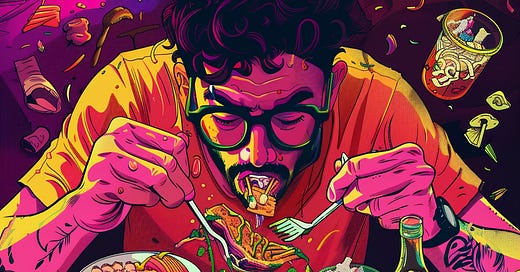To eat, or not to eat! That is the question!
I eat when I’m hungry, when I’m sad, when I’m anxious, when I’m bored, when I’m lonely, when I’m happy and the list goes on.
I admit! I have been a bit obsessed by the questions around nutrition, what you really need to eat, and how. Of course, there is some baseline and then there is a dependence on your level of activity and target physical / cognitive performance state.
I was raised in a culture where food equaled love. Therefore, my relationship with food is way more emotional than I had previously realized. I eat when I’m hungry, when I’m sad, when I’m anxious, when I’m bored, when I’m lonely, when I’m happy and the list goes on.
Recently, I have been working on decoupling my eating habits from my hunger signals to reduce the likelihood of mindless eating, or eating as a means to escape my emotions. One good way to do that is to limit eating to a particular time window during the day, commonly known as intermittent fasting. Since it has no instructions around eliminating food groups or calories modifications, it is not considered a diet, but rather an eating regimen or pattern.
I usually do a 15-18 hour fast depending on the day, get kinda antsy to eat around noon and instead of eating go for a jog, and then break my fast with a low carb plant-based protein smoothie, and snack on almonds and carrots until dinner which is my only solid meal. This way I can reduce the number of glucose spikes I experience throughout the day and therefore have been enjoying a corresponding remarkable level of predictability in my energy level until early evening. And even though I do yoga in the morning, jogging in mid-day, and relatively intense cognitive work most of the day, I do not miss not having carbs which was previously a big part of my assumption about what I needed for this lifestyle.
I have been getting increasingly curious about the limits of this and how the body reacts to eating even less while maintaining, or even improving, the ability to perform physically and cognitively taxing activities. I recently listened to a very interesting podcast featuring Mindy Pelz. She has done quite a bit of work on eating regimens and their impact on the processes inside the body including hormonal modulations and triggers.
You should probably check out her work directly if you are interested because it has way more detail than I can reproduce here, but I would say the following is a decent summarization:
Now, I haven’t checked the science of all the above but evolutionary speaking it makes sense to me. If the body is deprived of food for long enough, it falls into a survival mode and its priority becomes fixing you so that you can move and hunt / gather food. Hence cellular detox to reduce chances of dying of infection while starving, dopamine release to keep you motivated to look for food, and stem cell regen to repair injuries and enhance mobility. Beautiful, isn’t it?
The immediate question when I bring this up is: how would you deal with hunger? Well, that’s a good question, eh?
While I have been experimenting with something between intermittent and autophagy fasting in the past few months, I have noticed a few different flavors of hunger and interestingly how they go away when the cause is removed without eating. For example, a day after heavy carb consumption the type of hunger I feel is different than the day after poor sleep, or a day when neither of the above happened. Generally speaking, and I haven’t verified if there’s science, I feel that a lot of my carb craving and hunger is coming from bad behaviors like poor physical and mental maintenance.
I did find the following flavors / causes of hunger online though:
Blood sugar levels: When blood sugar levels drop (hypoglycemia), the body releases hormones like glucagon and epinephrine, which stimulate hunger to encourage you to eat and raise blood sugar levels. This could also happen temporarily as a result of heavy carb consumption in previous meals. Maintaining a flat blood glucose level is a good way to avoid this volatility.
Poor sleep: Sleep deprivation disrupts the normal production and release of ghrelin, leading to elevated ghrelin levels even when you're not truly hungry. There have actually been studies showing a correlation between poor sleep and carb craving.
Nutritional deficiency: Gradual increase in feeling hungry and not feeling satiated even after eating if the specific mineral or vitamin is still missing. I don’t know how to tell what specifically is missing though!
Stress: Our good old friend! The stress hormone cortisol can increase ghrelin levels and decrease leptin sensitivity, leading to increased hunger and cravings for sugary or fatty foods.
Situationally triggered hunger: Cravings associated with a place, mood, or other types of context. That ice cream shop near my old place that every time I pass, I feel nostalgic and have no option but to grab a scoop, eh?
There are, of course, many other factors like medical conditions, medications, and gender differences involved here that I have no qualification to get into. But the summary is that hunger is way more complex than “your body needs food”.
Dr. Mindy’s recommendation was to start small and gradually increase the fasting window, learn about your hunger signals and what they mean, and be quantitative esp for 24+ hour fasts by monitoring your blood sugar and ketone level.
I am intrigued and interested. All that repair for free? Sign me up!





